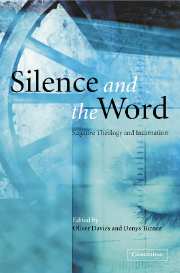Book contents
- Frontmatter
- Contents
- Notes on contributors
- Preface
- Introduction
- 1 Apophaticism, idolatry and the claims of reason
- 2 The quest for a place which is ‘not-a-place’: the hiddenness of God and the presence of God
- 3 The gift of the Name: Moses and the burning bush
- 4 Aquinas on the Trinity
- 5 Vere tu es Deus absconditus: the hidden God in Luther and some mystics
- 6 The deflections of desire: negative theology in trinitarian disclosure
- 7 The formation of mind: Trinity and understanding in Newman
- 8 ‘In the daylight forever?’: language and silence
- 9 Apophasis and the Shoah: where was Jesus Christ at Auschwitz?
- 10 Soundings: towards a theological poetics of silence
- Select bibliography
- Index
6 - The deflections of desire: negative theology in trinitarian disclosure
Published online by Cambridge University Press: 22 September 2009
- Frontmatter
- Contents
- Notes on contributors
- Preface
- Introduction
- 1 Apophaticism, idolatry and the claims of reason
- 2 The quest for a place which is ‘not-a-place’: the hiddenness of God and the presence of God
- 3 The gift of the Name: Moses and the burning bush
- 4 Aquinas on the Trinity
- 5 Vere tu es Deus absconditus: the hidden God in Luther and some mystics
- 6 The deflections of desire: negative theology in trinitarian disclosure
- 7 The formation of mind: Trinity and understanding in Newman
- 8 ‘In the daylight forever?’: language and silence
- 9 Apophasis and the Shoah: where was Jesus Christ at Auschwitz?
- 10 Soundings: towards a theological poetics of silence
- Select bibliography
- Index
Summary
The spirituality of the first Christian centuries was shaped by two convictions – that Christian identity was a matter of coming to share by God's gift the relation that eternally subsists between the Logos and the divine Source; and that what we encounter in prayer is never capable of being reduced to a finished conceptual scheme, however much we may labour to remove obvious inadequacies and misunderstandings in our speech about God. Both convictions have roots in pre-Christian concerns about the relation between God and ‘being’ in general or between God and mind; but these themes are given new and pretty specific content in relation to the figure of Jesus of Nazareth: the language of divine relatedness gradually supersedes that of a descending scale of participation in divinity, and the personal quality of relation between Logos and Source becomes determinative for trinitarian language. As the scheme was slowly matured in the fourth and fifth centuries, however, emphasis was laid upon the idea that the divine essence constituted the mysterious heartland of Godhead.
- Type
- Chapter
- Information
- Silence and the WordNegative Theology and Incarnation, pp. 115 - 135Publisher: Cambridge University PressPrint publication year: 2002
- 7
- Cited by



